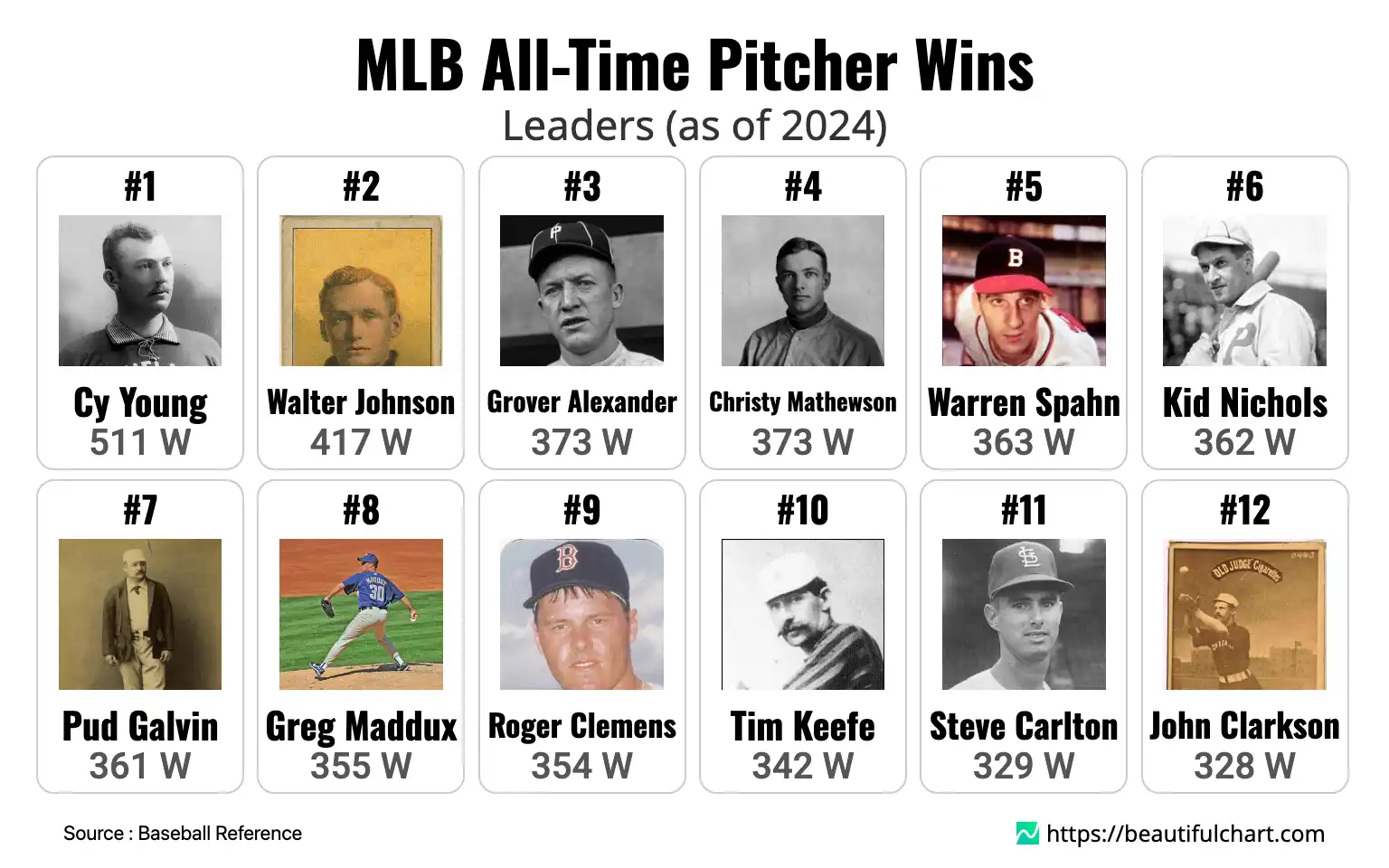The list of all-time wins leaders in Major League Baseball is a journey through the sport's rich history, dominated by figures from its earliest days. At the pinnacle stands Cy Young, whose staggering 511 wins represent a record considered unbreakable in modern baseball. Following him are legends like Walter Johnson, Grover Alexander, and Christy Mathewson, whose high win totals reflect an era when starting pitchers were expected to complete games and pitch far more frequently than they do today. This ranking highlights the evolution of pitching and celebrates the enduring legacies of the game's most dominant arms.

A Career Win in baseball is credited to a single pitcher on the victorious team who was on the mound when their team took the lead for good. This statistic is a traditional measure of a pitcher's success and effectiveness over their entire career.
The Unassailable Peaks of Pitching History
The roll call of Major League Baseball's all-time winningest pitchers is a testament to a bygone era of the sport. The names at the top—Cy Young, Walter Johnson, Grover Alexander—belong to a time when the game was fundamentally different. Pitchers were workhorses, often starting over 40 games a season and completing the vast majority of them. The five-man rotation, pitch counts, and specialized bullpens that define modern baseball were concepts far in the future. Consequently, the win totals achieved by these early legends have created a statistical pantheon that seems unreachable for today's athletes. Cy Young's 511 victories, for instance, are not just a record; they are a symbol of a lost era of endurance and raw durability. To put it in perspective, a modern pitcher would need to win 25 games for 20 consecutive seasons to even approach Young's total, a feat that is simply unimaginable in the current structure of the game.
Evolution of the Pitcher's Role
The transition from the Deadball Era to the Live-Ball Era, and subsequently into the modern age of analytics, has profoundly reshaped the role of a pitcher. In the early 20th century, the strategy was straightforward: the starting pitcher was expected to go the distance. This environment allowed pitchers like Walter Johnson, known for his overpowering fastball, and Christy Mathewson, a master of control and strategy, to accumulate wins at a prolific rate. As the 20th century progressed, the introduction of relief pitchers began to change the calculus. By the time pitchers like Warren Spahn and Steve Carlton came along, the complete game was becoming less common, yet they still managed to compile impressive win totals that bridge the gap between the old and new schools. Today, the emphasis has shifted almost entirely to preservation and specialization. Starters are managed carefully to avoid injury and fatigue, often being pulled after six innings regardless of their performance. The rise of setup men and closers means that opportunities for starting pitchers to earn a win are more limited than ever, making the achievements of the pitchers on this list even more remarkable.
What the Numbers Represent
Accumulating a high number of wins is not merely a measure of a pitcher's individual skill; it is also a reflection of playing for successful teams, longevity, and an incredible amount of resilience. Pitchers like Greg Maddux and Tom Glavine, who pitched in the heart of the steroid era, stand out as modern masters of the craft. They relied not on overwhelming power but on precision, intelligence, and an ability to outthink hitters. Their presence in the top echelons of the wins list demonstrates that even as the game changed, greatness could still be achieved through artistry and guile. Similarly, the careers of Nolan Ryan and Don Sutton, who pitched for multiple decades, highlight the importance of longevity. Their ability to adapt and remain effective over such long periods allowed them to climb the ranks and solidify their place among the all-time greats, proving that endurance, in any era, is a key component of a Hall of Fame career.
Key Takeaways
The Dominance of Early-Era Pitchers
- The top of the all-time wins list is populated by pitchers from the early 20th century.
- Pitchers like Cy Young and Walter Johnson benefited from an era where starters pitched more innings and completed most of their games.
- Their win totals are considered largely unbreakable by modern standards due to fundamental changes in how the game is played.
The Modern Era's Challenges
- Contemporary pitchers face significant hurdles in accumulating high win totals, including five-man rotations, strict pitch counts, and the use of specialized relief pitchers.
- Longevity and adaptability have become key for modern pitchers like Greg Maddux and Roger Clemens to even approach the lower tiers of the all-time list.
- The win statistic itself is now viewed differently, with analytics offering a broader context for evaluating a pitcher's performance beyond a simple win-loss record.
Top Ranking
#1 Cy Young 511 W
Denton True "Cy" Young's name is synonymous with pitching excellence, and for good reason. His 511 career wins are the most in MLB history, a record widely considered to be untouchable. Pitching from 1890 to 1911, Young was the definition of a workhorse, leading his league in wins five times and throwing over 400 innings in a season five times. His career spanned a period of significant change in baseball, yet his dominance remained a constant. The prestigious Cy Young Award, given annually to the best pitcher in each league, was named in his honor, cementing his legacy as the benchmark against which all other pitchers are measured. His incredible durability and consistency set a standard that will likely never be matched.
#2 Walter Johnson 417 W
Walter "The Big Train" Johnson was one of the most intimidating pitchers to ever step on a mound. Known for his blazing fastball, he dominated the American League for 21 seasons with the Washington Senators, from 1907 to 1927. His 417 wins rank second all-time, and he remains the career leader in shutouts with 110. Johnson was a two-time American League MVP and led the league in strikeouts 12 times, a record that still stands. His quiet, sportsmanlike demeanor off the field stood in stark contrast to his overpowering presence on it. Johnson's career is a model of sustained excellence and stands as a pillar of baseball's Deadball Era.
#3 Grover Alexander 373 W
Grover Cleveland "Old Pete" Alexander compiled a remarkable career despite battling epilepsy and the trauma of serving in World War I. Pitching from 1911 to 1930, he amassed 373 wins, tied for third all-time. He made an immediate impact, winning 28 games as a rookie for the Philadelphia Phillies, a modern record that still holds. Alexander's greatest weapon was his pinpoint control, which allowed him to lead the league in wins six times and shutouts seven times. His 90 career shutouts are the most in National League history. His performance in the 1926 World Series, where he famously struck out Tony Lazzeri with the bases loaded, remains one of the most iconic moments in baseball lore.
#3 Christy Mathewson 373 W
Christopher "Christy" Mathewson was one of baseball's first true superstars, known as much for his character and intelligence as for his pitching prowess. In a 17-year career from 1900 to 1916, primarily with the New York Giants, he won 373 games, tying him for third on the all-time list. Mathewson was a master of the "fadeaway" pitch (an early version of the screwball) and possessed impeccable control. He won 30 or more games in a season four times and recorded one of the most dominant performances in World Series history in 1905, pitching three shutouts against the Philadelphia Athletics. A college-educated man, Mathewson was a role model who helped legitimize the sport in its early days.
#5 Warren Spahn 363 W
Warren Spahn holds the record for the most career wins by a left-handed pitcher, with 363. His incredible career spanned 21 seasons, from 1942 to 1965, with his peak years coming with the Boston and Milwaukee Braves. Spahn's career is a testament to longevity and consistency; he won 20 or more games in a season 13 times, a feat he accomplished more than any other pitcher in the modern era. Unlike many power pitchers, Spahn relied on his intelligence, a deceptive delivery, and a wide array of pitches to keep hitters off-balance well into his 40s. He famously quipped, "Hitting is timing. Pitching is upsetting timing," a philosophy that defined his remarkable and enduring success on the mound.
| Rank | Name | Indicator | Subindicator |
|---|---|---|---|
1 | 511 W | 906 Games | |
2 | 417 W | 802 Games | |
3 | 373 W | 696 Games | |
3 | 373 W | 636 Games | |
5 | 363 W | 750 Games | |
6 | 362 W | 621 Games | |
7 | 361 W | 697 Games | |
8 | 355 W | 744 Games | |
9 | 354 W | 709 Games | |
10 | 342 W | 600 Games | |
11 | 329 W | 741 Games | |
12 | 328 W | 531 Games | |
13 | 326 W | 623 Games | |
14 | 324 W | 807 Games | |
14 | 324 W | 774 Games | |
16 | 318 W | 864 Games | |
17 | 314 W | 777 Games | |
18 | 311 W | 656 Games | |
19 | 310 W | 527 Games | |
20 | 307 W | 565 Games |





